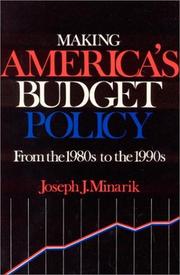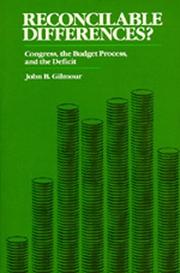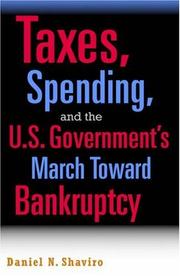| Listing 1 - 10 of 36 | << page >> |
Sort by
|

ISBN: 1315289210 1315289199 1315289202 9781315289199 9780765633002 0765633000 9781315289205 9781315289212 9781315289182 1315289180 9780873325738 9780873326216 0873325737 0873326210 1315289180 Year: 2015 Publisher: Abingdon, Oxon : Routledge,
Abstract | Keywords | Export | Availability | Bookmark
 Loading...
Loading...Choose an application
- Reference Manager
- EndNote
- RefWorks (Direct export to RefWorks)
Budget --- Taxation --- Budget deficits

ISBN: 0415055407 9786610478491 1134936508 1280478497 0203026160 9780203026168 661047849X 9781134936458 1134936451 9781134936496 1134936494 9781134936502 9780415055406 9781280478499 9781134936472 1134936478 Year: 1992 Publisher: London ; New York : Routledge,
Abstract | Keywords | Export | Availability | Bookmark
 Loading...
Loading...Choose an application
- Reference Manager
- EndNote
- RefWorks (Direct export to RefWorks)
The growth and persistence of government budget deficits is causing increasing concern in both developed and developing countries. They have provoked extreme responses: some economists hold that they have devasting effects, others that they have no real impact at all. Budget Deficits and Economic Activity in Asia examines both of these claims in the context of the Asian economies. After testing for the feasibility of the current levels of budget deficits and therefore of the current fiscal policies, the author turns to a quantification of the effects on money supply, inflation, ag
Taxes --- Asia --- Budget deficits --- Economic conditions --- Deficits, Budget --- Budget --- Deficit financing --- 1945 --- -Budget deficits - Asia. --- Asia - Economic conditions - 1945 --- -Budget deficits --- -Taxes --- Budget deficits - Asia --- -Budget deficits - Asia --- Budget deficits - Asia.
Book
ISBN: 1624174531 9781624174537 1624174523 9781624174520 Year: 2013 Publisher: New York : Nova Publishers,
Abstract | Keywords | Export | Availability | Bookmark
 Loading...
Loading...Choose an application
- Reference Manager
- EndNote
- RefWorks (Direct export to RefWorks)
Tax evasion --- Budget deficits --- United States.

ISBN: 052090995X 0585054274 9780520909953 0520067789 9780520067783 0520069439 9780520069435 9780585054278 Year: 1990 Publisher: Berkeley, CA : University of California Press,
Abstract | Keywords | Export | Availability | Bookmark
 Loading...
Loading...Choose an application
- Reference Manager
- EndNote
- RefWorks (Direct export to RefWorks)
Gilmour traces the development of the congressional budget process from its origin through the emergence of reconcilliation and Gramm-Rudman-Hollings. He shows how changes in process have brought about far-reaching shifts in congressional power, and explains why they have failed to control the explosion of budget deficits.Throughout the last decade budgetary issues have dominated the national political agenda as the deficit has skyrocketed to previously unimaginable levels. In this important book, John Gilmour traces the continuing quest of Congress over the last fifteen years to reform its budgeting system in the hope of producing better policy. He shows that the enactment of the Congressional Budget Act of 1974 and the introduction of the reconciliation procedure in 1980 have produced a budgetary system in which congressional majorities can get what they want, provided only that they can agree on a comprehensive budget policy. From his thorough analysis, Gilmour concludes that, while the reforms have not produced balanced budgets, they have eliminated procedural obstructions to the adoption of a coherent budget.New budget procedures have transformed the way Congress works. Before the reforms of 1974 and 1980, Congress had an extremely fragmented, disintegrated budgetary system in which the budget emerged almost haphazardly from the independent actions of numerous committees. Gilmour shows that reconciliation procedures in the budget process makes total revenue, total expenditures, and the size of the deficit matters of deliberate choice, consolidating decisionmaking to an extent unprecedented in the history of the modern Congress.Yet, despite the striking structural and procedural changes, and despite its highly majoritarian features, the budget process has failed to reduce dissatisfaction with congressional handling of money. Deficits have been larger, not smaller, and overall spending has gone up. Gilmour deftly shows that the massive budget deficits of the Reagan years were due primarily to the failure of the House, the Senate, and the President to agree on how to reduce spending or increase taxes enough to eliminate the deficit. Responsibility for budgetary failure, he argues, must rest with Congress and its inability to reach consensus, not on the new budget process, which, given what we can expect from procedural change, has been quite successful.
Budget --- United States --- Budget deficits --- HISTORY / United States / General.

ISBN: 9780511618253 9780521869331 9780521689588 9780511349898 0511349890 0521869331 0521689589 0521689589 1107171296 1281085960 9786611085964 0511350791 0511349025 0511348053 0511573545 0511618255 Year: 2007 Publisher: Cambridge : Cambridge University Press,
Abstract | Keywords | Export | Availability | Bookmark
 Loading...
Loading...Choose an application
- Reference Manager
- EndNote
- RefWorks (Direct export to RefWorks)
The United States is moving toward a possible catastrophic fiscal collapse. The country may not get there, but the risk is unmistakable and growing. The 'fiscal language' of taxes, spending, and deficits has played a huge and under appreciated role in the decisions that have pushed the nation in this dangerous direction. Part of the problem is that by focusing only on the current year, deficits permit politicians to ignore what is looming down the road. The bigger problem lies in the belief, shared by people on the left and the right alike, that 'tax cuts' and 'spending cuts' lead to smaller government, when in fact the characterization of any new policy as a change in 'taxes' or in 'spending' is purely a matter of labeling. This book proposes a better fiscal language for US budgetary policy, rooted in economic fundamentals such as wealth distribution and resource allocation in lieu of 'taxes' and 'spending'.
Fiscal policy --- Taxation --- Budget deficits --- Business, Economy and Management --- Economics
Book
ISBN: 1282159844 9786612159848 0881324965 1441617558 9781441617552 0881324329 9780881324327 9781282159846 9780881324969 Year: 2009 Publisher: Washington, DC : Peterson Institute for International Economics,
Abstract | Keywords | Export | Availability | Bookmark
 Loading...
Loading...Choose an application
- Reference Manager
- EndNote
- RefWorks (Direct export to RefWorks)
Budget deficits --- Debts, External --- Fiscal policy --- International economic relations

ISBN: 0300123531 9786612088858 1282088858 0300145330 9780300145335 9781282088856 9780300123531 Year: 2008 Publisher: New Haven : Yale University Press,
Abstract | Keywords | Export | Availability | Bookmark
 Loading...
Loading...Choose an application
- Reference Manager
- EndNote
- RefWorks (Direct export to RefWorks)
In this immensely timely book, Andrew Yarrow brings the sometimes eye-glazing discussion of national debt down to earth, explaining in accessible terms why federal debt is rising (and will soon rise much faster), what effects it may have on Americans if debt is not brought under control, why our government borrows, and what it will take to pay it all back. The picture Yarrow paints should concern all Americans. Specifically, he brings to light how rising Medicare, Social Security, and other spending on one hand, and insufficient government revenues on the other, make a mockery of fiscal responsibility. Deficits and debt, Yarrow asserts, are crowding out spending on needed investments in science, environment, infrastructure, and other domestic discretionary programs and could severely harm our nation's and our citizens' future. But he makes clear that this does not have to be a doomsday scenario. If we act in a bipartisan fashion to restore fiscal health, our legacy to the next generation can be much more than trillions of dollars of IOUs.
Debts, Public --- Budget deficits --- Fiscal policy --- Political Science --- Law, Politics & Government --- Public Finance
Book
ISBN: 1626181497 9781626181489 1626181489 9781626181496 Year: 2013 Publisher: New York Nova Publishers
Abstract | Keywords | Export | Availability | Bookmark
 Loading...
Loading...Choose an application
- Reference Manager
- EndNote
- RefWorks (Direct export to RefWorks)
Environmental impact charges. --- Carbon taxes --- Budget deficits --- Energy policy --- United States.
Book
ISBN: 0813189330 0813171970 0813156742 Year: 2004 Publisher: Lexington, Kentucky : The University Press of Kentucky,
Abstract | Keywords | Export | Availability | Bookmark
 Loading...
Loading...Choose an application
- Reference Manager
- EndNote
- RefWorks (Direct export to RefWorks)
In the past thirty years, Congress has dramatically changed its response to unpopular deficit spending. While the landmark Congressional Budget Act of 1974 tried to increase congressional budgeting powers, new budget processes created in the 1980's and 1990's were all explicitly designed to weaken member, majority, and institutional budgeting prerogatives. These later reforms shared the premise that Congress cannot naturally forge balanced budgets without new automatic mechanisms and enhanced presidential oversight. So Democratic majorities in Congress gave new budgeting powers to Presidents Reagan
Budget --- Budget process --- Finance, Public --- Budget deficits --- United States. --- Reform. --- Powers and duties.
Book
ISBN: 9789351509899 9351509893 9789351509905 9351509907 9351509885 Year: 2016 Publisher: [Place of publication not identified] SAGE
Abstract | Keywords | Export | Availability | Bookmark
 Loading...
Loading...Choose an application
- Reference Manager
- EndNote
- RefWorks (Direct export to RefWorks)
An in-depth analysis set in the context of the ongoing debate on fiscal policy vis-à-vis monetary policy.
Budget deficits --- Fiscal policy --- Finance, Public --- Deficits, Budget --- Budget --- Deficit financing --- E-books --- Public Finance --- Political Science --- Law, Politics & Government
| Listing 1 - 10 of 36 | << page >> |
Sort by
|

 Search
Search Feedback
Feedback About
About Help
Help News
News